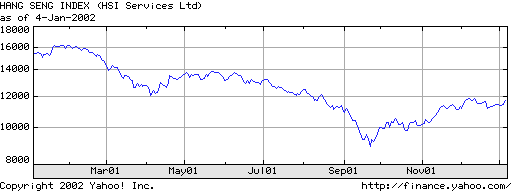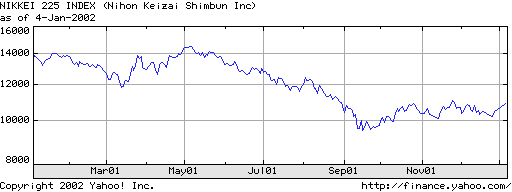International Stock Outlook for 2002
A massive and historic shift in wealth is taking place across the globe which will have profound effects on the financial markets this year and beyond. At least two countries are poised to experience unprecedented growth in the face of a developing global depression while a long-term economic powerhouse is in the process of losing its status as the world's wealthiest country.
Nothing quite shows the outlook for the global economy quite like the world's stock market indexes. Where economic forecasting fails and growth projections have their limits, the chart tells all. When money is "lost" in the market it does not go, as someone has suggested, to "money heaven." Nor does it disappear forever into some financial vortex; rather, it simply changes hands. This velocity of money can be seen on a grand scale by surveying the major stock exchange indices of the world. It may surprise you to discover where much of it is going, especially in light of the failure of the financial press to cover this wealth transfer. There seems to be a huge media black-out where certain foreign markets are concerned, principally those countries that are undergoing bull markets. Instead, all of the focus is directed at markets that are performing poorly, thereby denying investors the chance to participate in these foreign equity booms. When the U.S. market was hot, everyone from around the world was invited to participate as the concept of "global investing" was heavily touted. But now that the tables have turned and the U.S. is slipping while markets of countries that we helped finance are booming, U.S. investors are being given the cold shoulder and are not invited to join the party. Fortunately, there are ways of "crashing the party" and getting on board while the getting is good. We've talked about this in The Bear Market Report and will discuss it in greater later in this article.
Many foreign countries, particularly in Asia and South America, will have the misfortune of watching their markets and economies deflate severely in 2002 and beyond. One prominent example is Hong Kong. The country's Hang Seng Index has been under the declining force of one series of cycles after another. Most notable has been the complete dominance of the 24-week cycle, a cycle which normally doesn't make its presence known except in bear markets. The fact that the 24-week cycle has been able to force prices lower proves that much larger cycles are weighing against the Hang Seng. Cycle channel analysis shows the index is due at least one and possibly two more downward legs in its ongoing crash this year. The heady days of the '90s when the Hang Seng, along with the other "Asian Tigers," soared the vertiginous heights are over. Worse things lie ahead for Hong Kong's market.

After nearly 12 years of decline, Japan's Nikkei index won't have it quite so bad as other Asian markets this year. The Nikkei was down 31 percent in 2001 but is up 12.36% since September 21 (the global bottom of the dominant interim cycle). The Nikkei's cycle channels are sideways with a minor upward slope early in 2002 but should turn down slightly later on this year when the force of the dominant trading cycle bottoms in October.

The Russell 2000 and the Value Line are good barometers for measuring the overall strength of small-cap companies in the U.S. Both indexes are pictures of strength and momentum right now, reflecting very well the mini bull market underway in many small caps over the past few months. The small caps should peak sometime in February along with the master trading cycle but until then there is considerable upside potential in either index. Once the cycles peak, however, there will be equally great downward potential and the small caps will represent excellent short selling opportunities later in the year.
You can always get a feel for where the next international "hot spot" will be by looking at the stock markets of the world's major countries. Three countries in particular stand out as being on an enormously strong financial footing, as measured by their respective stock exchanges. They are, in order of strength, Russia, China, and Israel.
The best-performing stock market for the past one year is the Russia RTS index, up an impressive 95 percent. Considering the NASDAQ was down nearly 20% and most other international indexes were down by an equally large percentage, this speaks volumes about where the wealth of the world's elite is going. It also raises a number of interesting questions and answers some as well. For one thing, it explains the billions in U.S. dollars that were funneled into Russia all through the 1990s and also accounts for central bank tinkering into Russia's markets in the late 90s. It is now evident that the George Soros-engineered multi-billion dollar bail-out of the Russian economy back in 1998 is paying handsome dividends. All it took was a huge injection of U.S. dollars to turn things around for this Third World leviathan. Don't be surprised when Russia soon begins dominating the news headlines in the near future now that the profits from the newfound wealth are being funneled into its massive military apparatus.
Russia is followed by China's Shenzhen index, which was up 91% for 2001. China's Shanghai stock index was up 88%. That the two countries with the most favorable leanings toward communism and dictatorship have the strongest financial outlooks right now is cause for shock and alarm. Yet the Western press remains silent on this issue. It won't be long now before the Russian and Chinese economies begin to experience strong growth, even in the wake of global deflation. Russia's Moscow Times stock market index.
Israel's Tel Aviv 100 index has been rising since mid-September and seen a nearly 90 degree rise since December. The Israeli market has seen something incredibly bullish in the near future, although it is too early to tell what this might be. In view of the fact that Jerusalem is once again being talked up by political and religious leaders the world over as being a candidate for the "world's capital" once the global economy has been completed might be one explanation. The world's richest investors now see Israel as a safe haven for their wealth after the U.S. markets peaked in 2000 and are now clearly have begun a secular bear market. Of interest, Israel's market cycles tend to bottom with much greater emphasis than most other foreign exchanges as the chart clearly shows. There is little in the way of excess supply weighing down the Israeli stock market, and the chart shows it plainly.
Someone has asked, "If there is in fact a global long-wave cycle (the K-Wave) then how do you explain Russia's stock market outlook being so bright in the face of this massive deflation? Why are Russia and China exempt from these bearish pressures while most other countries are not?" The answer is hard to explain due to the complexities involved with breaking down the cycles. But in simple terms this has to do with how a country's financial system is structured: the types and numbers of financial instruments, the dynamics of its stock and bond markets, the number of listed stocks, and how actively traded those stocks are, among other things. The cycles are universal, yet they can make their presence known very strongly in one country and much less visibly in another based on the "maturity" of a country's market and economy and level of public participation. The simple fact is that China and Russia have already had their cyclical bear markets and they are now emerging from them very nicely. Russia's market has incredible upside potential in the coming year and it is doubtful it will suffer to the degree and extent that the U.S. will this year. Russia should continue to be the top-performing stock market in the world for 2002.
Little known among most U.S. investors is the fact that foreign markets can be traded via online brokerages specializes in international transactions, such as Brunswick Direct. After all, if our tax dollars are going to support a Russian, Israeli, or Chinese financial bull market, why not join in on the profits? Strong foreign equity markets like Russia and Israel will represent excellent counter-trend trading opportunities in the upcoming years as most countries will join the U.S. in the downward spiral brought about by K-Wave deflation and the crashing long-term stock market cycles. The Bear Market Report will be paying special attention to these foreign winners in the upcoming year and our portfolios should be the better for it.
















